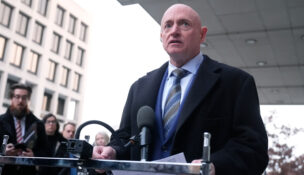No Labels party transforms to support independent candidates in state elections
Kiera Riley Arizona Capitol Times//August 1, 2025//
No Labels party transforms to support independent candidates in state elections
Kiera Riley Arizona Capitol Times//August 1, 2025//
Key Points:
-
After recent court battle, the No Labels party heads in a new direction
-
Party opens itself up to independent candidates for state offices
-
Organizers hope to ease ballot access for independents, promote civil unity
Organizers behind last year’s open primary initiative have commandeered the state’s near-defunct No Labels party to pave a smoother path for independent candidates in state elections.
The benefits of running with an established state political party include a lower signature threshold to qualify as a candidate, as well as the infrastructure and endorsement necessary to organize a political campaign — benefits not normally accessible to independent candidates.
No Labels, now with a new state party chair, will not be called No Labels for much longer. And though the party maintains some foundation with the national committee, they have “complete autonomy” in reimagining their bylaws and approach regarding unaffiliated candidates.
“In the end, what are we trying to promote?” asked the new No Labels state party chair, Paul Johnson, who is the former mayor of Phoenix. “We believe that an open primary and more people participating is to our advantage, and we’re going to look for candidates and for people who believe that, who believe in civility matters, decency matters, and focusing on the big issues matter.”
No Labels sought and secured party status in Arizona in March 2023. The national outfit sought to only run a third-party presidential candidate, so when some statements of interest for statewide and legislative offices came in under the No Labels banner, the party, under former leadership, sued the secretary of state to keep them off.
The district court originally agreed that having the party associate with unwanted candidates burdened its rights. But in a stunning reversal that paved the way for the party’s latest transformation, the 9th Circuit Court of Appeals overturned the decision, finding participation by party members in the democratic process outweighed any alleged injury to the No Labels party.
The party was then on the run to dissolution, but Johnson, key organizer behind the Make Elections Fair Initiative, or Prop. 140, said he struck a deal with the national party to take over as state chair and use the shell of the state party — now about 39,804 voters strong — to create new access opportunities for independent candidates.
“We’re gonna make certain that at least independents and unaffiliated voters are included in that process,” Johnson said.
Under state law, independent candidates, or those running without a recognized political party, are tasked with gathering 3% of the total registered voters who are not members of a political party. In contrast, those affiliated with political parties have to seek out a fourth or a half of a percent of the total qualified signers in the state.
In 2024, to qualify as an independent candidate, a person would need to collect 42,303 signatures. To be eligible under No Labels, a candidate would need 1,288 signatures.
“It’s been almost impossible in the past, and we’re going to make it easy,” Johnson said.
As the new state party takes shape, some candidates have already signaled their intent to run under the No Labels banner.
One will appear on a general election ballot for the first time after Richard Grayson, a write-in candidate, received the single vote necessary to clear the primary in the 7th Congressional District.
Grayson does not seek office in earnest. His hobby for more than four decades has been seeking election not to win, and, in the process, he highlights loopholes in state election laws.
As for No Labels, Grayson paints the move as more of a “revenge” on the party that battled in court to prevent any candidate, aside from a hand-picked presidential contender, from running under the party’s banner.
A former Republican candidate for state superintendent of public instruction, Stephen Neal, switched his statement of interest to No Labels days ago to appeal to voters of various partisan backgrounds. “I felt that it shared the value of bringing people together,” Neal said.
Beyond Neal, Tyson Draper, a TikToker and fan of President Donald Trump and Kari Lake, filed to run for governor under No Labels as well.
Johnson said the first order of business is changing the name of the party, then to alter the bylaws, convene a nominating committee, and start fielding independent candidates for offices up and down the ballot, with the potential to raise money down the line.
He clarified that any candidate could run for any office under the party banner, but they plan to support select candidates through the nominating committee process. They are now looking for opportunities in the 2026 and 2028 elections.
“Today, there really is no structure for this party, so we have to create one,” Johnson said. “We know what our North Star is, but there’ll be mess in the process. That’s unimportant. What’s important is that we change the system, and that we begin to open it up to people who have differing ideas about how to solve these big problems that we have.”














































